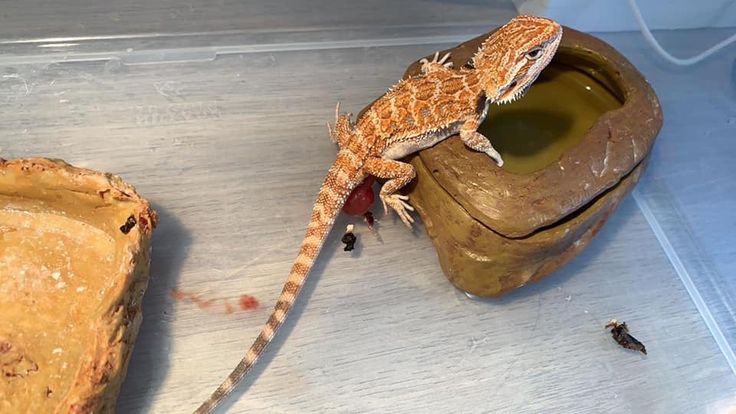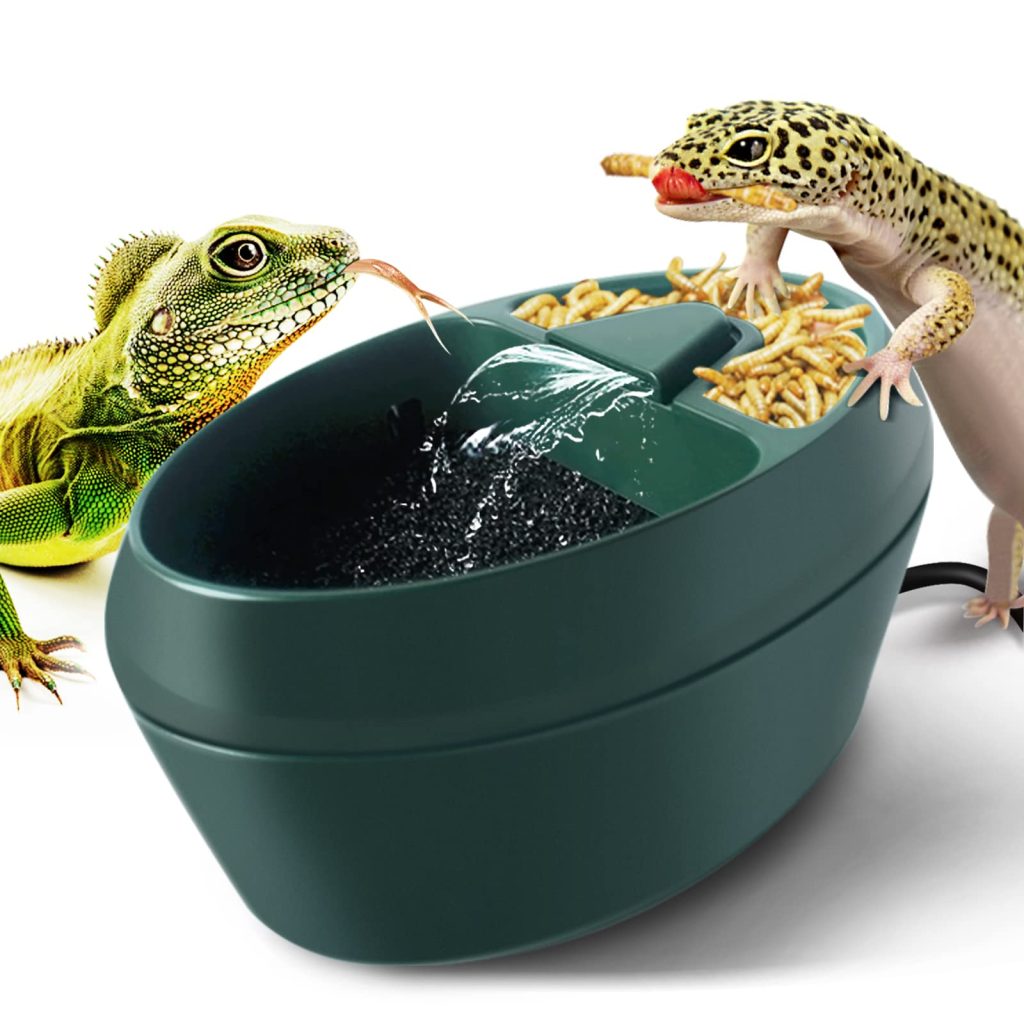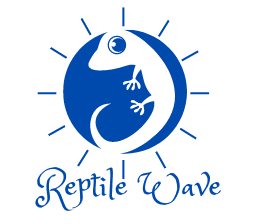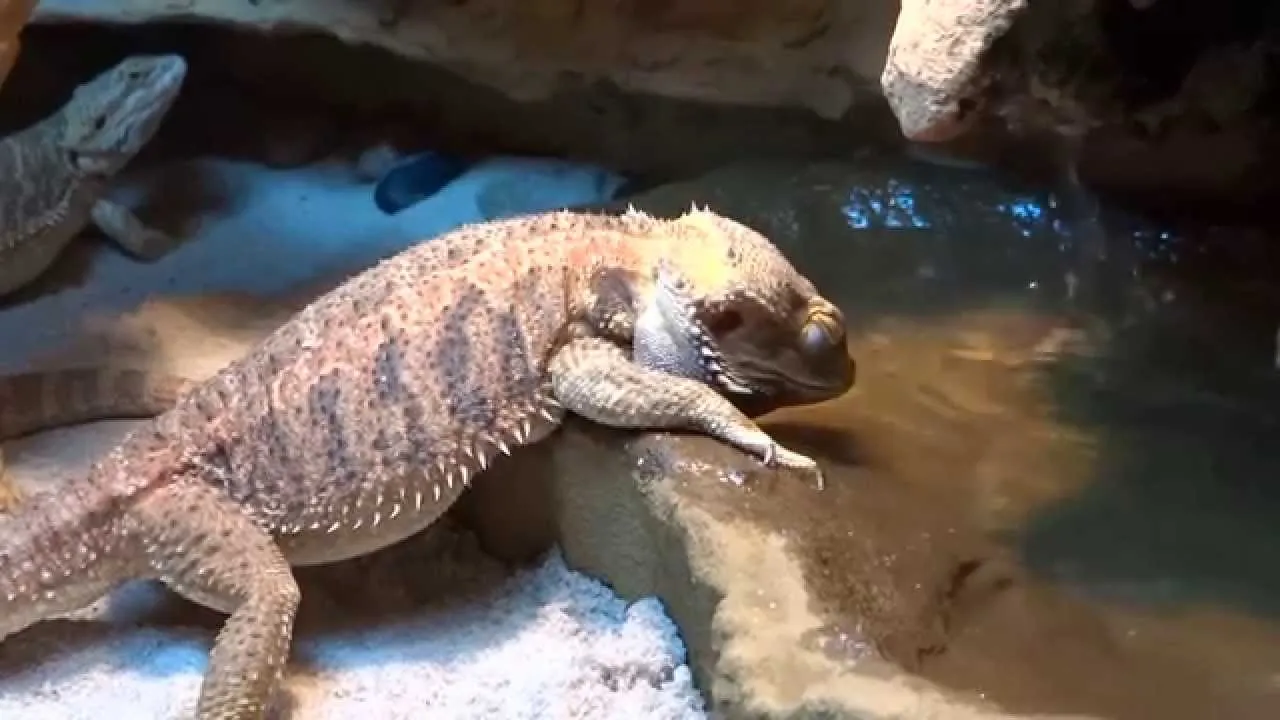If your bearded dragon drinks a lot of water, it means they’re not feeling well. This can happen if they don’t get enough water or if their home is too dry. Sometimes, when they take a long nap-like rest called brumation, they drink more water too. But if your dragon acts sick, like being tired all the time or not wanting to eat.
Furthermore, drinking too much water could show that they have problems with their kidneys, and body functions, or have an infection. If their house is too hot or if their food isn’t balanced, they might drink extra water. In addition, lady dragons might drink more when they’re going to have babies.
Signs of a Bearded Dragon Drinking a Lot of Water

You can identify health issues in your bearded dragon early on by keeping an eye out for behavioral changes as well as physical changes. The following are things to watch out for:
Behavior Changes
- Restlessness: If your dragon is moving around a lot more than usual, it might mean something’s up.
- Tongue Flicking: Normally, they flick their tongues to explore, but if they’re doing it loads or near water, they might be thirsty.
- Odd Drinking: Instead of just licking water, if they’re dunking their heads or bodies a lot, they could be extra thirsty or trying to make up for not drinking enough.
Physical Signs
- Swelling: If their belly looks bigger than usual, it could be from drinking too much water, which might mean trouble for their insides.
- Weight Changes: Quick weight gain or loss could mean something’s not right.
- Skin Color: Dehydration could make their skin look less colorful or even sunken in places.
- Eyes: If their eyes seem sunken or dull, they might need more water.
How Much Water Should a Bearded Dragon Drink Per Day?
Bearded dragons need between 10-30 milliliters (ml) per kilogram of body weight per day. On average, a bearded dragon requires around 20 milliliters of fresh water per kilogram of body weight daily.
As a general rule of thumb, you can estimate 1 ounce of water per day for every pound of body weight. For example, a 10-pound bearded dragon would need approximately 10 ounces of water each day.
Can Bearded Dragons Die From Drinking Too Much Water?
Yes, bearded dragons can die from drinking too much water. Even though they need water to stay healthy, having too much can cause a problem called water intoxication or poisoning. This can mess up the balance of important stuff in their body, making them feel tired, weak, or even swollen. Sometimes, it can lead to seizures.
Make sure your bearded dragon has a little dish of fresh water to drink from. Also, keep their home just humid enough and give them a good mix of foods like veggies and fruits. Watch how much water they drink and how they act. If you think something’s wrong, it’s best to ask a vet who knows about reptiles for help.
Why Do Bearded Dragons Drink More Water?
These are the main reasons why bearded dragons drink more water. Owners need to keep an eye on their dragon’s behavior, food, and surroundings to figure out why they’re drinking too much water and fix it.
Brumation
Brumation is like a sleepy time for reptiles, similar to when mammals hibernate. When bearded dragons brumate, they might eat less and move around less.
Dehydration can happen during brumation because they’re not drinking as much water and moving less. But even though they’re sleepy, they still need water for their bodies to work right.
To help keep them hydrated, owners should make sure they have water available all the time. Giving them a little soak in a shallow dish of water now and then can also help prevent dehydration.
Diet Changes
Giving your bearded dragon more fluid items, such as fresh vegetables and fruits, helps them drink more water. Furthermore, juvenile dragons may be very inquisitive about tasting new meals.
If their diet consists mostly of dry, processed foods, they drink extra water to compensate. Eating largely dry pellets leaves them extremely thirsty.
If they eat more frequently or in larger amounts, they drink more to aid digestion. Young dragons with rapid metabolisms also require more water to grow large and powerful.
Environmental Factors (Humidity Levels, Temperature)
Low humidity in the tank can make your bearded dragon lose more water when they breathe. So, they might drink more to make up for it.
When it’s hot, your dragon’s body works faster, and they might lose more water through their skin and breathing. So, they might drink more to stay cool and hydrated.
If there’s not enough water around for them to drink, they might drink more when they do find some. Putting water bowls in different spots in their home makes it easier for them to drink.
Changes in their home or feeling stressed out by new things can also make them want to drink more water. Things like different lights, moving stuff around in their home, or getting new friends can stress them out.
How Do Bearded Dragons Regulate Water Intake?

The age and size-specific water needs of bearded dragons enables owners to tailor their care practices accordingly. In addition, promoting optimal health and well-being for these unique reptiles.
General Hydration Needs
Young bearded dragons, particularly those under 1 year old, grow quickly and have high metabolic needs, so they need more water to support their development. Adult bearded dragons need less water than juveniles, but they still require adequate hydration for good health and proper organ function.
Juvenile bearded dragons eat water-rich foods like insects and leafy greens to help with their rapid growth. Adult bearded dragons eat a balanced diet but still need a variety of fresh foods to meet their hydration needs.
Physiological Requirements
Young bearded dragons grow fast and need lots of water for their bodies to keep up. Adults need less water than young ones, but they still need plenty to stay healthy. Young dragons eat lots of watery foods like bugs and leafy greens to help them grow. Adult dragons eat a mix of foods to stay hydrated.
When it’s hot or the air is dry, young dragons might need more water because they’re more sensitive to changes in their environment. Young dragons move around a lot and might lose water faster. Adults move less but still need water for stuff like basking and digesting.
The Ideal Sizes of Water Dishes to Keep Your Bearded Dragon Hydrated Throughout Its Life
To keep your bearded dragon well hydrated and prevent dehydration or other water-related health issues, it’s important to select the right size water dish. You may contribute to the health and well-being of your dragon by choosing a water dish that is appropriate for their size and age.
| Age Category | Size Category | Water Dish Size |
| Juveniles (0-6 months) | Small/Medium-Sized (0-12 inches) | 6-8 inches diameter |
| Sub-adults (6-12 months) | Small/Medium-Sized (0-12 inches) | 8-10 inches diameter |
| Adults (1 year and older) | Large/Giant (12+ inches) | 10-12 inches diameter |
FAQs
Here are some answers to frequently asked questions.
Your bearded dragon might be in the water to regulate its body temperature, hydrate its skin, or it could be a sign of health issues.
Ensure a shallow water dish is available, mist the enclosure to increase humidity, offer water-rich foods, and monitor their water intake regularly.
Hatchlings need more water than adults. Offer water twice a day by misting their enclosure or providing droplets for them to lick.
Juveniles (3-12 months): Juvenile bearded dragons continue to require regular hydration. Offer water twice a day through misting or droplets.
Sub-Adults (1-2 years): Sub-adults can drink water once a day. Monitor their water intake and refill the dish as needed.
Adults (2+ years): Adult bearded dragons can drink water once a day or less. Keep an eye on their hydration levels.
Yes, bearded dragons need access to water every day to stay hydrated and maintain their overall health.
Watery feces could be a sign of various issues, including digestive problems, infections, or diet-related issues.
Final Words
If your bearded dragon drinks a bunch of water, keep an eye out for possible problems. If they act differently, like being extra squirmy or flicking their tongue a lot, it could mean they’re really thirsty or not feeling great. Signs like puffiness, weight changes, or a different skin color might mean they’re dehydrated or have a big health issue.
Also, things like sleepy time (brumation), what they eat, and where they live can change how much water they need, so check on them a lot. Knowing how much water they need for their age and seeing if they’re not doing well is super important to keep your bearded dragon healthy.

